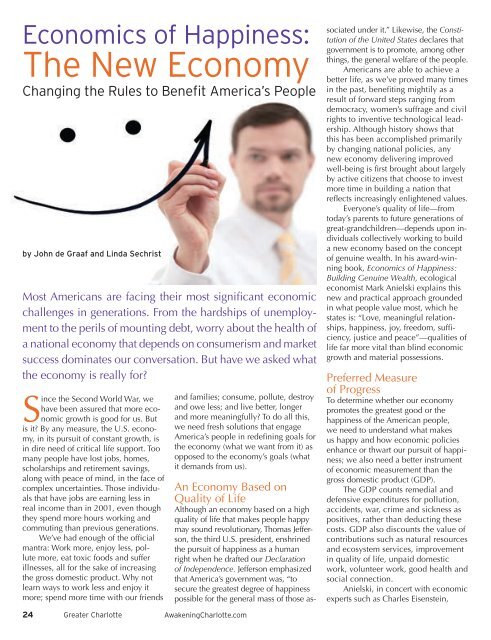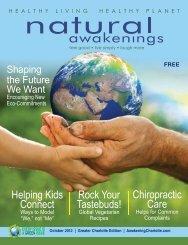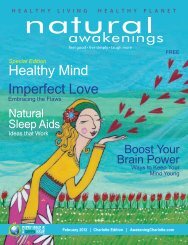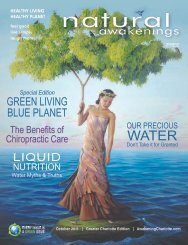2Over-training. - Natural Awakenings Magazine Charlotte
2Over-training. - Natural Awakenings Magazine Charlotte
2Over-training. - Natural Awakenings Magazine Charlotte
You also want an ePaper? Increase the reach of your titles
YUMPU automatically turns print PDFs into web optimized ePapers that Google loves.
Economics of Happiness:<br />
The New Economy<br />
Changing the Rules to Benefit America’s People<br />
by John de Graaf and Linda Sechrist<br />
Most Americans are facing their most significant economic<br />
challenges in generations. From the hardships of unemployment<br />
to the perils of mounting debt, worry about the health of<br />
a national economy that depends on consumerism and market<br />
success dominates our conversation. But have we asked what<br />
the economy is really for?<br />
Since the Second World War, we<br />
have been assured that more economic<br />
growth is good for us. But<br />
is it? By any measure, the U.S. economy,<br />
in its pursuit of constant growth, is<br />
in dire need of critical life support. Too<br />
many people have lost jobs, homes,<br />
scholarships and retirement savings,<br />
along with peace of mind, in the face of<br />
complex uncertainties. Those individuals<br />
that have jobs are earning less in<br />
real income than in 2001, even though<br />
they spend more hours working and<br />
commuting than previous generations.<br />
We’ve had enough of the official<br />
mantra: Work more, enjoy less, pollute<br />
more, eat toxic foods and suffer<br />
illnesses, all for the sake of increasing<br />
the gross domestic product. Why not<br />
learn ways to work less and enjoy it<br />
more; spend more time with our friends<br />
and families; consume, pollute, destroy<br />
and owe less; and live better, longer<br />
and more meaningfully? To do all this,<br />
we need fresh solutions that engage<br />
America’s people in redefining goals for<br />
the economy (what we want from it) as<br />
opposed to the economy’s goals (what<br />
it demands from us).<br />
An Economy Based on<br />
Quality of Life<br />
Although an economy based on a high<br />
quality of life that makes people happy<br />
may sound revolutionary, Thomas Jefferson,<br />
the third U.S. president, enshrined<br />
the pursuit of happiness as a human<br />
right when he drafted our Declaration<br />
of Independence. Jefferson emphasized<br />
that America’s government was, “to<br />
secure the greatest degree of happiness<br />
possible for the general mass of those as-<br />
24 Greater <strong>Charlotte</strong> Awakening<strong>Charlotte</strong>.com<br />
sociated under it.” Likewise, the Constitution<br />
of the United States declares that<br />
government is to promote, among other<br />
things, the general welfare of the people.<br />
Americans are able to achieve a<br />
better life, as we’ve proved many times<br />
in the past, benefiting mightily as a<br />
result of forward steps ranging from<br />
democracy, women’s suffrage and civil<br />
rights to inventive technological leadership.<br />
Although history shows that<br />
this has been accomplished primarily<br />
by changing national policies, any<br />
new economy delivering improved<br />
well-being is first brought about largely<br />
by active citizens that choose to invest<br />
more time in building a nation that<br />
reflects increasingly enlightened values.<br />
Everyone’s quality of life—from<br />
today’s parents to future generations of<br />
great-grandchildren—depends upon individuals<br />
collectively working to build<br />
a new economy based on the concept<br />
of genuine wealth. In his award-winning<br />
book, Economics of Happiness:<br />
Building Genuine Wealth, ecological<br />
economist Mark Anielski explains this<br />
new and practical approach grounded<br />
in what people value most, which he<br />
states is: “Love, meaningful relationships,<br />
happiness, joy, freedom, sufficiency,<br />
justice and peace”—qualities of<br />
life far more vital than blind economic<br />
growth and material possessions.<br />
Preferred Measure<br />
of Progress<br />
To determine whether our economy<br />
promotes the greatest good or the<br />
happiness of the American people,<br />
we need to understand what makes<br />
us happy and how economic policies<br />
enhance or thwart our pursuit of happiness;<br />
we also need a better instrument<br />
of economic measurement than the<br />
gross domestic product (GDP).<br />
The GDP counts remedial and<br />
defensive expenditures for pollution,<br />
accidents, war, crime and sickness as<br />
positives, rather than deducting these<br />
costs. GDP also discounts the value of<br />
contributions such as natural resources<br />
and ecosystem services, improvement<br />
in quality of life, unpaid domestic<br />
work, volunteer work, good health and<br />
social connection.<br />
Anielski, in concert with economic<br />
experts such as Charles Eisenstein,







